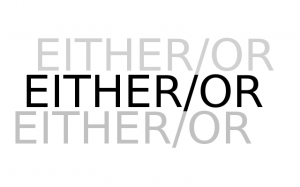 The Prisoner’s Dilemma is a contrived game popular among mathematicians, used to model aspects of cooperation or conflict between individuals.
The Prisoner’s Dilemma is a contrived game popular among mathematicians, used to model aspects of cooperation or conflict between individuals.
A False Dilemma is the presentation of two alternatives as being absolute and exclusive.
I think that we frequently become prisoners of false dilemmas.
We have a tendency to categorize people. We like to put people in nice little boxes. Often these boxes represent a binary Either/Or choice. You are ‘liberal’ or ‘conservative’. You are ‘christian’ or ‘atheist’. You are ‘Mac’ or ‘PC’.
The danger of these labels is that they frequently represent a false dilemma: they assume that there are only two options, and that these options are mutually exclusive.
Perhaps you live in Northern Ireland, and it’s assumed that you’re either Protestant or Catholic. But maybe you’re neither? Maybe your agnostic, or Hindu? Or maybe you consider yourself part of the ‘catholic‘ (or universal) church, yet still feel there are church practices that need to be protested? Or perhaps you consider yourself a ‘Protestant’, but don’t really feel like protesting all that much?
Or take political labels. All too often I see political dialog reduced to a polarised conservative-liberal axis, as if there are only two possible stances on any political issue. But what if we want to be both? Maybe want to be conservative, in that I think there are many good things that should be conserved, or preserved. And yet at the same time maybe I like the idea of being generous, which is after all a synonym for liberal.
Is it possible to transcend these labels?
Perhaps I can be a skeptic and a believer. Maybe trust and curiosity can walk hand in hand.
Maybe I can be a Christian and a secularist. What if I have strongly held religious convictions and yet still want to live in a society that doesn’t enforce a particular dogma, that creates space for people of all persuasions?
Fortunately, as a Canadian I live in a country where many of our discussions involve a plurality rather than a duality. We have several viable political parties at the federal and provincial level. Although our history has included binary contrasts such as French/English, Catholic/Protestant, we’re now a multicultural, diverse society, and as such it’s harder to lock people into small boxes. It’s harder to see race, for example, in binary terms when your family is English-French-Norwegian-German, or your friends are Polish-Trinidadian-Canadian.
So let’s not allow ourselves to be locked in boxes. And let’s take care not to force others into this Either/Or duality either. Someone may disagree with you on one issue, but that doesn’t automatically put them in the ‘Other’ box, and make them your life-long opponent.
And as for me, I shall continue to proudly be a liberal, conservative, skeptic, believing, questioning, hoping, geeky, athletic individual.
I’ll even reject the Mac/PC conflict, and happily use both, with a fair helping of Linux thrown into the mix.